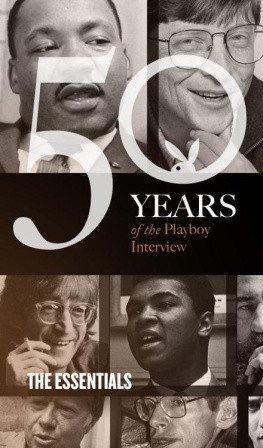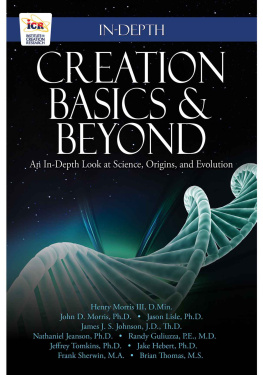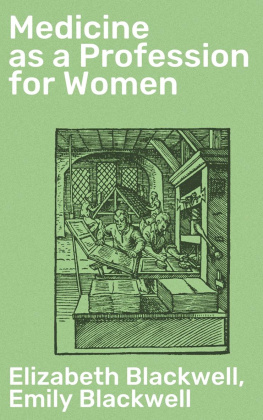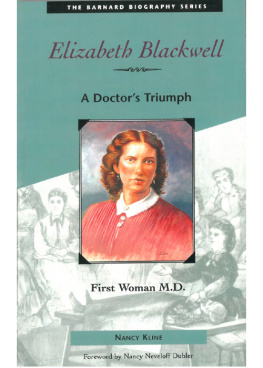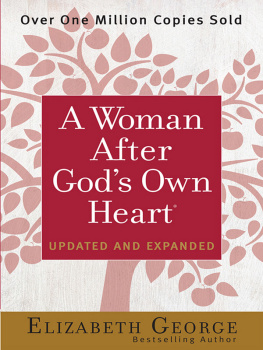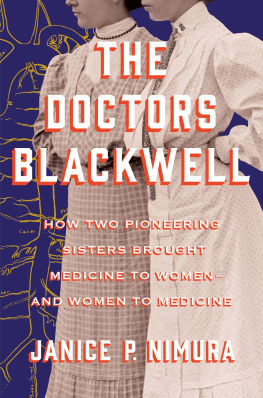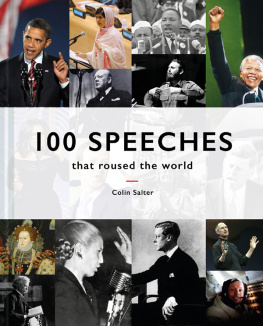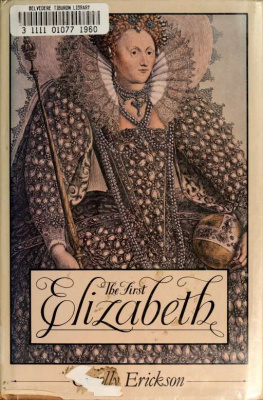WHO WAS
ELIZABETH BLACKWELL?
EXCERPTS AND SPEECHES
FOR AND BY
THIS REMARKABLE WOMAN
By
VARIOUS
Copyright 2021 Brilliant Women
This edition is published by Brilliant Women,
an imprint of Read & Co.
This book is copyright and may not be reproduced or copied in any
way without the express permission of the publisher in writing.
British Library Cataloguing-in-Publication Data
A catalogue record for this book is available
from the British Library.
Read & Co. is part of Read Books Ltd.
For more information visit
www.readandcobooks.co.uk
Contents
DEDICATED
TO ELIZABETH BLACKWELL
ELIZABETH BLACKWELL
By Frances E. Willard and Mary A. Livermore
Physician and author, born in Bristol, England, 3rd February. 1821. Her father, Samuel Blackwell, was a wealthy sugar refiner, a man of broad views and strong b enevolence.
At the political crisis of 1830-31 commercial affairs in England were thrown into confusion, and Mr. Blackwell was among those whose fortunes were swept away at that time. He removed with his family to the United States in August. 1832, and settled in New York, where he started a sugar refinery. He was rapidly amassing wealth when the financial crash of 1837 in the United States swept away his fortune through the wreckage of the weaker houses with which he had business relations. He turned his eyes to the West, and in 1838 removed his family to Cincinnati, Ohio. There he was stricken by fever and died at the age of forty-five years, leaving a family of nine children to their own resources among strangers.
Every cent of indebtedness left by the father was paid by his children. The three older daughters, of whom Elizabeth was the third, placed themselves at once at the head of the family. Two sons in school left their studies and took clerkships. The four younger ones were still in the nursery. The older sisters opened a boarding school for young women, and their liberal culture and enterprise won them a large patronage. The sisters felt the restrictions placed upon women in th matter of earning a livelihood, and they became convinced that the enlargement of opportunities for women was the one essential condition of their well-being in every way.
After six years of hard work, when all the younger members of the family had been placed in positions to support themselves, the sisters gave up the school.
Elizabeth resolved to study medicine, although she had to overcome a natural aversion to sickness of all kinds. She wrote to six different physicians for advice, and all agreed that it was impossible for a woman to get a medical education. She thought differently, however, and in 1844 she took charge of a Kentucky school to earn money for her expenses. In 1845 she went to Charleston, S. C., to teach music in a boarding-school, and there added a good knowledge of Latin to her French and German. There she entered the office-student class of Dr. Samuel Henry Dickson. In May, 1847, she applied for admission to the Philadelphia Medical School, but both college and hospital were closed to her. She applied to all the medical schools in the United States, and twelve of them rejected her application and rebuked her for temerity and indelicacy. The college faculty in Geneva, N. Y., and that in Castleton, Vt., considered her application, and the students in Geneva decided to favor her admission. In 1847 she entered the college as No. 417 on th e register.
In January, 1849, she was graduated with the Geneva class. A large audience witnessed the granting of the first medical diploma to a woman. Immediately after graduation. Dr. Elizabeth Blackwell went to Paris, France, where, after months of delay, she was admitted to the great lying-in hospital of the Maternity as a resident pupil, and several other schools permitted her to visit. She also studied under able private tutors. In 1850 and 1851 she "walked" St. Bartholomew's hospital in London, England, studying in the Women's Hospital and under private teachers. She returned to the United States, and in the autumn of 1881 she opened an office in New York City. She succeeded in building up a large practice, in spite of social and professional antagonism and ostracism.
The Society of Friends were the first to receive her warmly and support the new movement, and she soon became known as . a reliable physician. In 1853, with her sister, Dr. Emily Blackwell, she established in New York the New York Infirmary for Women and Children, which was incoqxirated and was for some years the only woman's hospital. In 1858 and 1859 she visited England and lectured in London, Birmingham and Liverpool on the connection of women wit h medicine.
In 1859 she was placed on the register of English physicians. Returning to America, she entered with the warmest interest into the questions of the Civil War, and the sisters organized in the parlors of the Infirmary the Ladies' Central Relief Association, sending off the first supplies to the wounded. That association was soon merged in the Sanitary Commission, in which the sisters continued to take an active part. In 1869 Dr. Elizabeth lectured in the Medical College of the New York Infirmary, which had been chartered as a college in 1865 At the close of 1869 she went to England and settled in London, where she practiced for some years. There she founded the National Health Society and worked in a number of social reforms. She aided in organizing the London School of Medicine for Women, in which she served as the first lecturer on the diseases of women. In 1878, after a serious illness, she settled in Hastings, England, continuing her consultation practice only and working energetically for the repeal of the unjust Contagious Dis eases Acts.
Up to the present time she has continued to work actively for the promotion of equal standards of morality for men and women. Of late she has become an active opponent of vivisection, regarding it as an intellectual fallacy, misleading research and producing moral injury. She gives close attention to municipal affairs, as she feels the responsibility involved in the possession of a vote, which she possesses as a householder of Hastings. She knows in advanced age no diminution of her zeal for right over wrong. In addition to her long and arduous labors as a teacher, as a student and as the pioneer woman physician. Dr. Elizabeth Blackwell has been a prolific author. Naturally, her works lie in the field of her profession. Between 1852 and 1891 she wrote the following important medical and scientific works: The Laws of Life in Relation to the Physical Education of Girls, How to Keep a Household in Health, The Moral Education of the Young in Relation to Sex, Wrong and Right Methods of Dealing with the Social Evil, Christian Socialism, The Human Element in Sex, The Corruption of New Malthusianism, The Purchase of Women a Great Economic Blunder, The Decay of Municipal Representative Government, The Influence of Women in the Medical Profession, Erroneous Methods in Medical Education





